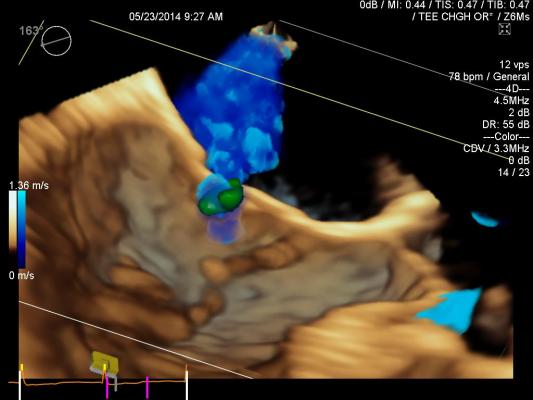
November 7, 2017 — Medtronic plc recently presented positive data for its self-expanding Intrepid transcatheter mitral valve replacement (TMVR) system in patients with severe, symptomatic mitral valve regurgitation. The data was presented as a First Report Investigation at the Transcatheter Cardiovascular Therapeutics (TCT) Annual Meeting, Oct. 29-Nov. 2 in Denver and simultaneously published in the Journal of the American College of Cardiology (JACC).
Data from the first 50 consecutive patients enrolled in the Intrepid Pilot Study demonstrated successful device implantation and a substantial reduction in mitral regurgitation at 30 days. The new data come on the heels of the first patient implant in the APOLLO trial, the first-ever pivotal trial approved by the U.S. Food and Drug Administration (FDA) to evaluate the safety and efficacy of the Intrepid TMVR system.
“These early outcomes with the Intrepid TMVR System are encouraging as we investigate a minimally-invasive alternative to surgical mitral valve replacement,” said Paul Sorajja, M.D., Headrick Family Chair, Valve Science Center at the Minneapolis Heart Institute Foundation and presenter of the Intrepid Pilot Study data at TCT. “The Intrepid TMVR System is easy to implant in the challenging mitral anatomy due to its conformable, dual-stent design and the device corrects the underlying mitral regurgitation in a significant majority of patients.”
The Intrepid Pilot Study was designed to evaluate valve safety and performance of the Intrepid TMVR System across sites in the United States, Europe and Australia. Initial 30-day outcomes showed that the Intrepid TMVR System was successfully implanted in 98 percent of patients. The early results also demonstrated notable reductions in mitral regurgitation, with patients experiencing either none/trace or mild mitral regurgitation at 30-days compared to moderate to severe at baseline. Patients also continued to have symptomatic improvements with 79 percent of patients classified as NYHA (New York Heart Association) class I or class II at their last follow-up.
“It is an exciting time for mitral valve replacement therapy as demonstrated by the promise of such truly innovative technologies that can positively impact patients suffering from mitral valve disease,” said Vinayak Bapat, M.D., cardiothoracic surgeon at Columbia University Medical Center/New York-Presbyterian Hospital, and principal investigator of the Intrepid Pilot Study. “We look forward to further investigation of the Intrepid TMVR System with the landmark APOLLO pivotal trial, which just got underway.”
The Intrepid TMVR system integrates self-expanding, dual-stent technology with a tissue valve to facilitate catheter-based implantation without the need for open-heart surgery. The Intrepid valve is compressed inside a hollow delivery catheter and is inserted between the ribs to enter the heart. The new replacement valve is expanded directly into the malfunctioning mitral valve. The outer stent frame is designed to attach and conform to the malfunctioning native valve without the need for additional sutures or tethers to secure the device in place. The inner stent houses the valve, which is made from bovine tissue and is intended to maintain blood flow.
The Intrepid TMVR system is available for investigational use only and it is not approved for use outside of clinical studies.
For more information: www.medtronic.com
Related Content


 November 14, 2025
November 14, 2025 









